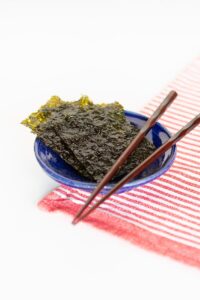In the world of nutrition, there’s a new superfood making waves, and it’s not your typical leafy green or exotic fruit. It’s seaweed, a marine plant that has been consumed for centuries in various parts of the world. In recent years, it has gained popularity for its numerous health benefits and versatility in the kitchen. In this comprehensive guide, we’ll delve into the surprising advantages of adding seaweed to your diet and explore its impact on your health.
Benefits of Eating Seaweed: Experience the Nutritional Powerhouse
Seaweed isn’t just another vegetable; it’s a nutritional powerhouse. Packed with essential vitamins, minerals, and antioxidants, it offers a wide array of nutrients that can benefit your overall well-being. Let’s take a closer look at the health benefits of seaweed:
1. Thyroid Function Support

One of the standout features of seaweed is its exceptional iodine content. Iodine is a vital mineral that plays a crucial role in thyroid health. Your thyroid gland relies on iodine to produce hormones that regulate metabolism. Incorporating iodine-rich foods like seaweed into your diet can help maintain optimal thyroid function and prevent iodine deficiency.
2. Blood Sugar Control
Studies suggest that certain types of seaweed, like brown seaweed, may contribute to better blood sugar control. The presence of bioactive compounds in seaweed can help stabilize blood sugar levels, making it a valuable addition for those concerned about diabetes or blood sugar spikes.
3. Cardiovascular Health
Seaweed has garnered attention for its potential to support heart health. It contains polyunsaturated fatty acids that can help reduce the risk of cardiovascular disease. Additionally, dietary fiber found in seaweed can aid in cholesterol management and blood pressure regulation, further promoting a healthy heart.
4. Gut Health and Digestion
For those interested in gut health, seaweed can be a game-changer. Its dietary fiber content supports a flourishing gut microbiome, enhancing digestion and preventing digestive issues. A diet rich in seaweed can lead to improved gut health and overall well-being.
5. Antioxidant Properties
Seaweed is a tasty marine plant that boasts antioxidant properties. These antioxidants combat free radicals in the body, potentially reducing the risk of chronic diseases and supporting your immune system.
The Versatility of Seaweed
Seaweed isn’t limited to sushi rolls or seaweed salads; it comes in various forms, making it easy to incorporate into your diet. Here are some popular ways to add seaweed to your meals:
- Miso Soup: Miso soup often features seaweed as a key ingredient, offering a flavorful way to enjoy its benefits.
- Seaweed Snacks: Crispy seaweed snacks have become a favorite among health-conscious individuals looking for a convenient and tasty way to boost their nutritional intake.
- Dietary Supplements: If you’re not a fan of the taste, dietary supplements containing seaweed extracts are available.
- Seaweed Flakes: These versatile flakes can be sprinkled on salads, rice, or various dishes to add a hint of umami flavor.
Exploring the Culinary Delights: How to Eat Seaweed

Seaweed isn’t just nutritious; it’s also incredibly versatile and can be a delightful addition to your culinary repertoire. Understanding how to eat seaweed and the different edible seaweed varieties available can open up a world of flavors and textures for your taste buds.
Eating Seaweed: A Culinary Adventure
When it comes to incorporating seaweed into your meals, creativity knows no bounds. Here are some delectable ways to eat seaweed:
1. Seaweed Snacks: For a quick and convenient snack, indulge in crispy seaweed snacks. These thin, flavorful sheets are often seasoned with a variety of seasonings, making them a satisfying and guilt-free treat.
2. Seaweed Salads: Edible seaweed varieties like wakame, dulse, or nori can be used to create refreshing salads. Simply rehydrate dried seaweed, toss it with your favorite salad ingredients, and drizzle with a light sesame oil dressing for an Asian-inspired twist.
3. Sushi Rolls: You’re likely familiar with nori, the seaweed used to wrap sushi rolls. Sushi-making at home allows you to experiment with different fillings, making it a fun and nutritious culinary adventure.
4. Incorporate into Soups: Add dried seaweed to soups and broths for a burst of umami flavor and nutrition. Miso soup, for instance, often features seaweed as a key ingredient, contributing to its unique taste.
5. As a Side Dish: Serve seaweed as a side dish alongside your favorite proteins and grains. It can be a tasty and nutritious complement to a variety of meals.
6. Edible Seaweeds: There is a wide variety of edible seaweeds to choose from, each with its unique flavor and texture. From the delicate sea lettuce to the slightly crunchy sea grapes, you can experiment with different types to find your favorites.
7. Fresh vs. Dried: While dried seaweed is readily available and easy to store, don’t forget about fresh seaweed if you have access to coastal areas. Fresh seaweed can be used in salads, soups, or even as a side dish, offering a unique, ocean-fresh experience.
Understanding Iodine Content

Iodine and Thyroid Health
Iodine is a trace element that is crucial for the proper functioning of the thyroid gland. The thyroid gland is responsible for producing hormones, primarily thyroxine (T4) and triiodothyronine (T3), which play a fundamental role in regulating metabolism. Without sufficient iodine, the thyroid gland cannot produce these hormones effectively, leading to various thyroid-related issues, including hypothyroidism.
Balancing Iodine Intake
Seaweed is an excellent dietary source of iodine, and for individuals with iodine deficiency or those at risk of it, incorporating seaweed can be beneficial. However, it’s essential to strike a balance.
1. Iodine Deficiency:
- Iodine deficiency can result in an underactive thyroid, which can lead to symptoms like fatigue, weight gain, and cognitive impairment.
- In regions where iodine deficiency is prevalent, adding seaweed to the diet or using iodized salt can help address this issue.
2. Excess Iodine Intake:
- On the flip side, excessive iodine intake, known as iodine excess, can also be problematic.
- Too much iodine can lead to hyperthyroidism, where the thyroid gland becomes overactive, potentially causing symptoms like rapid heartbeat, weight loss, and anxiety.
- Some types of seaweed, particularly kelp and certain brown seaweeds, can contain exceptionally high levels of iodine, and their consumption should be approached with caution.
Considering Dietary Sources:
When incorporating seaweed into your diet, it’s crucial to consider your overall iodine intake from various sources:
- Iodized Salt: Many table salts are iodized to prevent iodine deficiency, so if you’re already using iodized salt in your cooking, be mindful of the additional iodine from seaweed.
- Seafood: Seafood, especially fish and shellfish, is another significant dietary source of iodine. If you consume seafood regularly, it contributes to your iodine intake.
Moderation is Key:
The key takeaway here is moderation. While seaweed can provide essential iodine, it’s essential to monitor your iodine intake and consult with a healthcare professional, especially if you have preexisting thyroid issues or concerns about iodine levels in your diet.
Final Thoughts
Seaweed is a marine marvel with many health benefits waiting to be explored. From supporting thyroid function to aiding in blood sugar control, improving gut health, and promoting heart health, the potential advantages of adding seaweed to your diet are impressive. Just like any food, moderation is key, so enjoy seaweed in a balanced and varied diet.
Seaweed is not just a staple in Asian cuisine; it’s a valuable addition to any diet. Whether you’re looking to lose weight, improve your immune system, or maintain a healthy thyroid, consider incorporating this nutritious marine plant into your meals. Experience the surprising advantages of seaweed and embark on a journey to better health through the ocean’s bounty.
Other suggested articles:

